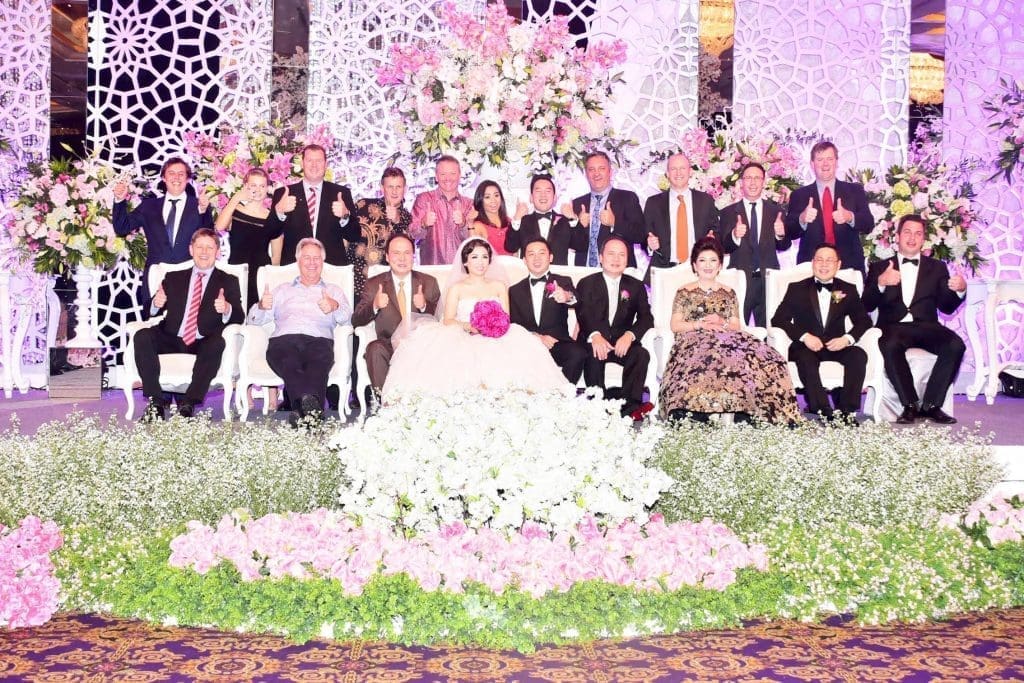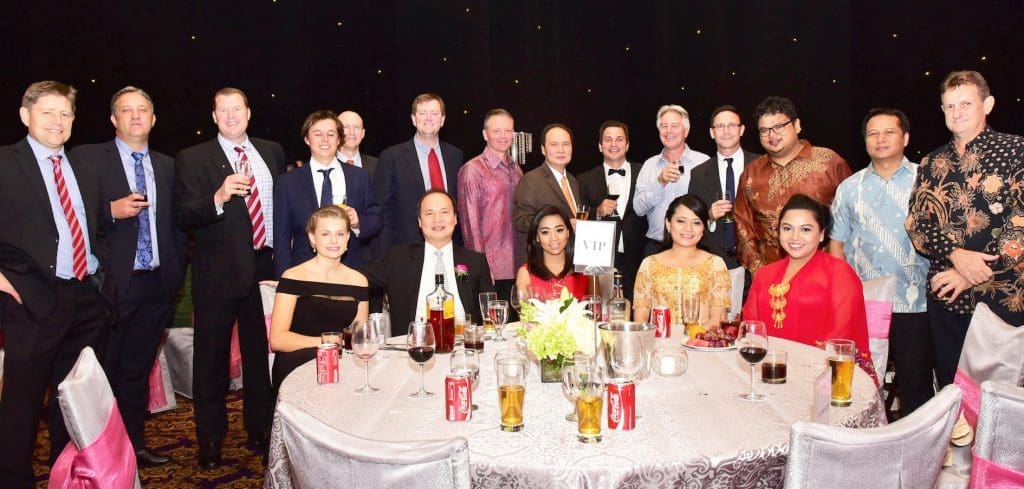
Pictured at the recent wedding of Catherine Hasan, the daughter of Sanko Hasan (PT TUM), to Ronald Irawan in Jakarta, are (standing from left): Hamish Shannon, Elders; Anna Gooden, Tony Gooden, Frontier; Dick Slaney, Elders; John and Ayu Ackerman, Daryl Hasan PT TUM; Ashley James and Will McEwin, Frontier; Jake Morse, Austrex; Cameron Hall, Elders; (seated from left) James Nason, Beef Central; Ross Ainsworth, PT Sumber Hewan; Buntoro Hasan PT TUM, Catherine and Ronald Irawan, Pudjantoro (PJ) Hasan PT TUM, Sanko Hasan PT TUM and Patrick Underwood, Elders. Click on picture to view in larger format.
IN 1993, John Gray, an American relationship counselor and author wrote his best selling book entitled “Men are from Mars, Women are from Venus”.
Gray claimed that the most common relationship problems between men and women are a result of fundamental psychological differences between the genders leading him to suggest that men and women are so different that they may as well have come from different planets.
When I try to analyze some of the many eruptions in the Australia-Indonesia relationship, I am frequently inclined to come to the same conclusion. Whether it’s illegal fishing, boat people, trade quotas, phone tapping, cattle trade closures or dealing with drug smugglers, there almost never seems to be a non-confrontational middle ground with any of the high profile issues. The histories and cultures of Australia and Indonesia are indeed so incredibly different that it is easy to accept the proposition that each nation might well have originated from separate planets.
The great irony however is the difference between the relationships at a personal level and those at the national level.
At a personal level, Indonesians are amongst the most polite, friendly and accommodating people anywhere in the world. It takes a great deal of bad mannered behaviour before the calm, smiling and polite Indonesian personality is finally forced to transform into an angry and hostile one. Just go to any bar in Bali where Australians are drinking and you will see what I mean.
So why is it so different at the national level?
I believe that the answer lies in the simple advice given to everyone who is considering doing business in Asia; the first step is to establish some form of personal relationship with your potential business partner.
This essential step has been understood for millennia in Asia; first find out what your business partner is like as a person through some form of social interaction and then, over time, come to a conclusion about the personality that reveals itself. Can I trust this person? Are their values compatible with mine? Would I be comfortable doing business with this person? In Indonesia this is achieved by numerous meetings with friends and family at dinners, celebrations and social outings while in Vietnam and China it more commonly involves sculling large volumes of fire water and watching how the other party behaves when their inhibitions vanish.
When I first decided to do business in Indonesia I did not know anyone and did not feel comfortable taking on a local partner that I hardly knew. As a result I established a rather expensive and highly regulated wholly owned foreign company. 15 years later, I know a significant number of Indonesians that I would happily join in a business partnership without a second thought.
Over an extended period of constant business and personal interaction, cultural barriers disappear and the true characters of people become obvious. At this point there are no planetary differences, just the day to day issues of life and business that are dealt with in predictable ways while serious problems are resolved by logical analysis, reasoned discussion and consensus.
The difference between Australian mateship and the Indonesian version is simply that a lot more time is required to understand how the other person thinks and reacts given the differences in language, culture, religion and a multitude of other factors.
Not only are we on the same planet, deep down we are all remarkably similar.
I can only conclude therefore that the principal problem with our national relationship is that high level political and diplomatic interactions are conducted by politicians and senior bureaucrats who, because of their busy schedules and relatively short tenures, can never hope to establish the kind of personal relationships that are essential to avoid or diffuse the constant barrage of prickly issues that threaten the peaceful coexistence of geographically close neighbours.
As a consequence, there appears little hope that our national leaders will ever develop the first class friendships that are the hallmark of the exceptionally close personal and business relationships developed between large numbers of individuals from both countries over recent decades.
A recent example of this was when Prime Minister Abbot made a public statement in which he implied that because Australia had given a significant amount of aid money to Indonesia following the Boxing Day Tsunami, that the Indonesian President should alter his stance on the sentences handed down to two Australian heroin smugglers.
Every Australian expatriate in Indonesia at the time collectively gasped when they heard this appalling proposition and explained as best they could to their Indonesian friends that the Prime Minister was a politician who frequently said things first and then thought about what he said later.
In the days that followed, a number of my Indonesian friends offered me some coins. When I asked what this was about, they explained with friendly sarcasm that they were happy to pay Australia back their Tsunami aid money because they were shocked and dismayed that Australia would ever consider using this gift as some sort of future political bargaining tool.
These gestures were heart felt but in no way personal but the message was clear; this type of statement from our national leader was about as thoughtless and disgraceful as it gets.
Thankfully, personal friendships did not suffer at all as the issue was discussed calmly and openly with Indonesian friends understanding that their Aussie mates were obviously not to blame for the bad manners of their Prime Minister.
In the national context however, the wound at the senior Indonesian government and political level is deep and without the benefit of the healing balm of friendship will take a long time to recover.
The live export cattle industry is a rather remarkable example of how large and complex industries are able to manage these potential interplanetary pitfalls through close and constant communications between commercial operators and their industry representatives.
These players have the luxury of longer-term employment to allow those essential trusting relationships to be built up over time. The live export industry has survived some incredible challenges since its establishment in the early 1990’s and continues to be managed by a cordial group of risk taking and fiercely competitive entrepreneurs on both sides who have made and art form of overcoming apparently insurmountable problems that fate and governments have a habit of putting their way at an uncomfortably high frequency.
Perhaps a better way to describe our difficult situation is that friends come from Mars but politicians come from Venus.

Indonesian-Australian personal relationships growing stronger at the recent wedding of Catherine Hasan, the daughter of Sanko Hasan (PT TUM), to Ronald Irawan in Jakarta. Pictured (standing from left): James Nason, Beef Central; Ashley James and Tony Gooden, Frontier International; Hamish Shannon, Elders; Will McEwin, Frontier International; Cameron Hall, Elders; John Ackerman; Buntoro Hasan, PT TUM; Patrick Underwood, Elders; Ross Ainsworth; Jake Morse, Austrex; Dhimas Brahmantya, Widodo Makmur Perkasa; Aryantho Budhi; Dick Slaney, PT Elders Indonesia; (seated from left): Anna Gooden; Pudjantoro (PJ) Hasan, PT TUM; Ayu Ackerman; Khadijah Burhani Arifin and Ajeng Friesiana, Widodo Makmur Perkasa. Click on picture to view in larger format.



HAVE YOUR SAY